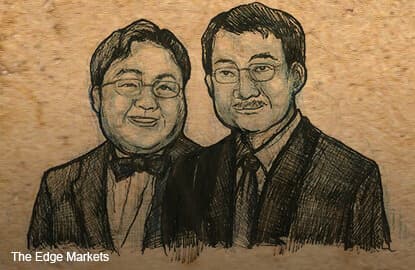
THE United States Department of Justice (DOJ) had in July said that an estimated US$3.5 billion was laundered from 1 Malaysia Development Bhd (1MDB) when it announced it was taking action to seize assets of certain individuals that were acquired from the stolen money. That DOJ action is in progress.
The Swiss authorities are also investigating criminal activities related to 1MDB transactions and had earlier cited a sum of money that exceeded US$4.0 billion. Its Attorney-General Michael Lauber had on Nov 10, said that Malaysia had rejected its request for help under the Mutual Legal Assistance treaty between the two countries.
In Singapore, the authorities have filed criminal charges against several individuals, including two former executives of BSI Bank, over various offences linked to transactions involving money that originated from 1MDB.
Yeo Jiawie, 34, is currently being tried on charges of tampering with witnesses while money laundering charges against him will be heard next April.
Yak Yew Chee, 57, had pleaded guilty and was sentenced to 18 weeks’ jail for charges of producing fraudulent letters and not reporting suspicious transactions related to money transfers of his clients Low Taek Jho or Jho Low and his father Tan Sri Larry Low Hock Peng.
According to Singapore Commercial Affairs Department (CAD), there were scores of pass-through transactions involving money that originated from 1MDB. But the charges filed against Yak were focused on the masking and layering of US$790.3 million that originated from 1MDB Energy (Langat) Ltd on Oct 23, 2012.
This 1MDB subsidiary had just raised US$1.75 billion through Goldman Sachs for the purpose of buying a power plant company from Genting Bhd. 1MDB also raised another US$1.75 billion to buy another power company from Tanjung Plc.
According to 1MDB’s audited accounts for FY March 31, 2013, Abu Dhabi’s sovereign wealth fund, International Petroleum Investment Co (IPIC), had co-guaranteed the two bond issues, and for that guarantee, 1MDB had transferred RM4.2 billlion (US$1.3 billion at the then exchange rate) to IPIC and its subsidiary Aabar Investments PJS Ltd (BVI).
Interestingly, 1MDB’s audited accounts never stated the full name of Aabar. It just said Aabar.
IPIC has since said that the BVI company did not belong to it, although its name is similar to the real subsidiary Aabar Investment PJS.
Singapore investigators have said that in total, four “fake” Aabar companies were created by those involved in the fraud and laundering.
The charges against Yak for helping his clients Jho Low and his father involved one of these fake Aabars — Aabar Investment PJS Limited.
The chart below, provided by Singapore’s Attorney-General Chambers, explains how the masking and layering of US$110 million that originated from 1MDB Energy was done with the money eventually ending up at Selune Ltd.
According to the US DOJ, Jho Low was the beneficial owner of Selune, the company which funded his purchase of a penthouse at the Time Warner building in New York.
Singapore has since closed the operations of both BSI and Falcon Bank in the city for their part in the money laundering. Falcon Bank is owned by the real Aabar.
According to documents released as part of the charges against Yak of BSI, there appeared to have been at least one attempt by BSI’s compliance department to ask Jho Low to explain the source of his money and reasons why millions were moved from his account to his father’s and back to him again through the accounts of various companies (what CAD calls layering).
An irate Jho Low wrote a long reply to BSI that it was done that way out of respect for family tradition and hierarchy and demanded that he not be asked to explain again (see his email).
Save by subscribing to us for your print and/or digital copy.
P/S: The Edge is also available on Apple's AppStore and Androids' Google Play.